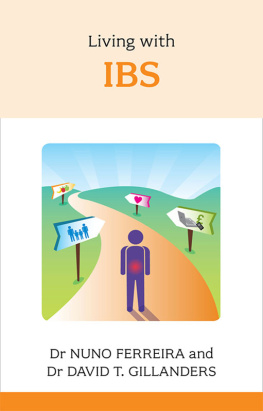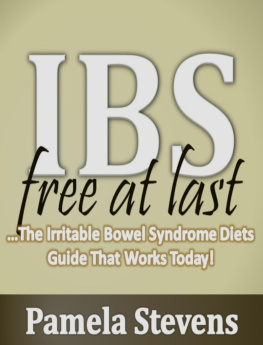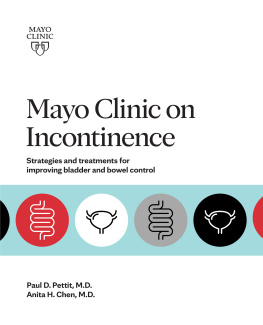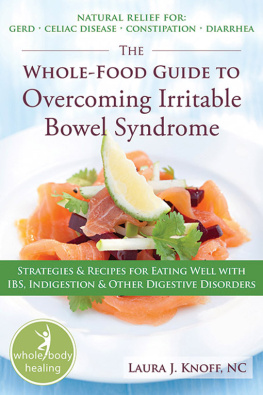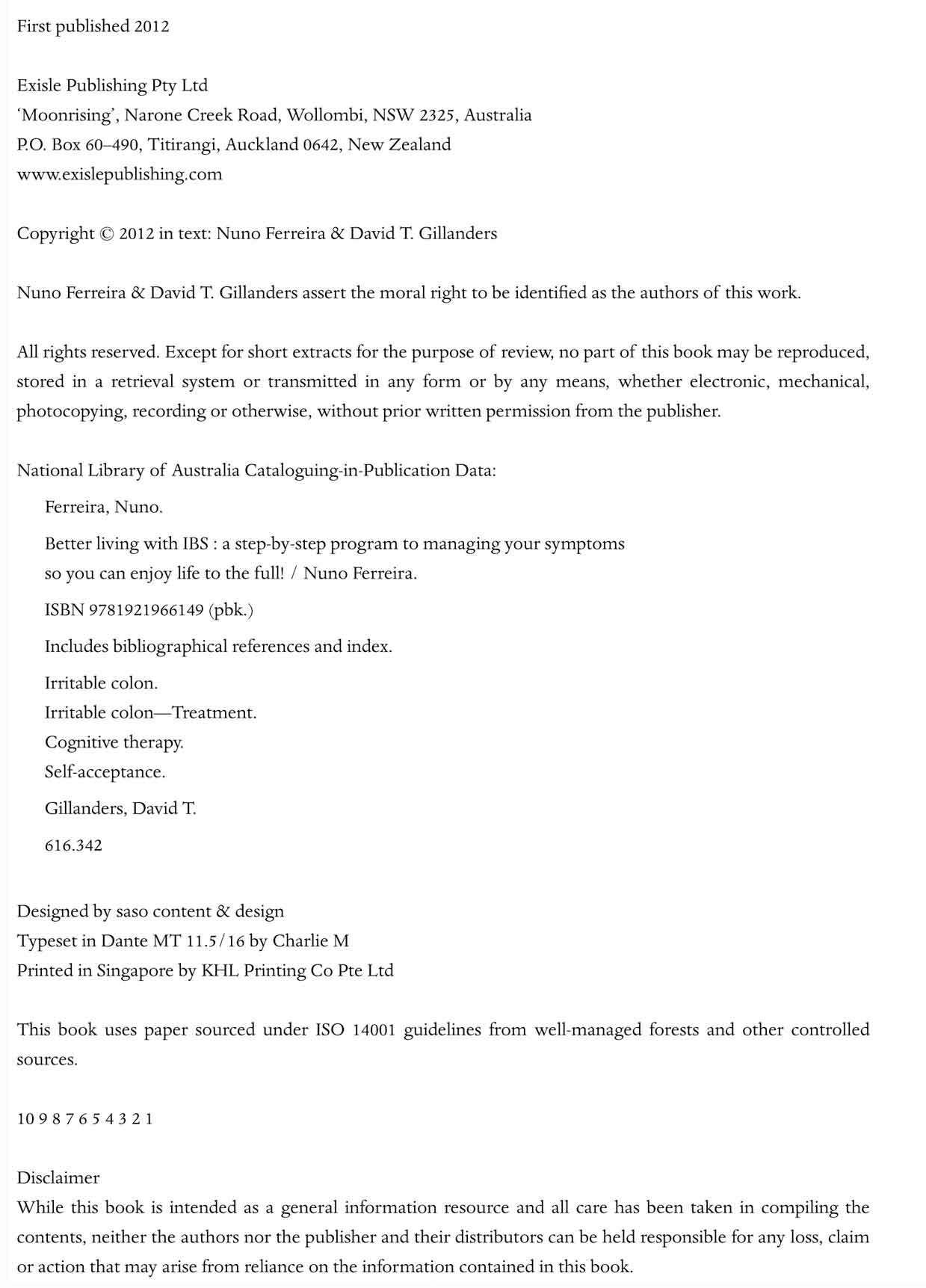
The problem of IBS often extends far beyond its symptoms. It can impact every area of ones life, an issue that can be missed by many healthcare providers. I am pleased to say that this issue is not missed in the book you hold in your hands. Rather, Drs Ferreira and Gillanders have produced something that specifically aims to help people suffering from IBS achieve a life that is less restricted by IBS; a life that also has meaning, vitality and quality. I have no doubt that the approach in this book will allow better living with IBS.
Kevin E. Vowles, PhD, Consultant Clinical Psychologist, The Haywood Hospital
This is a very worthwhile book for people who suffer from the unpleasant symptoms of Irritable Bowel Syndrome. Once the reader has been given an overview to this condition they are introduced to a range of workable ways to deal with it. Packed with practical exercises and scenarios, Better Living with IBS helps people to live the way that they want, potentially improving their overall quality of life. I would highly recommend this easily accessed text to anyone with IBS and to all health professions who deal with this complex chronic condition.
Dr Graeme D. Smith, University of Edinburgh
CHAPTER 1
What is IBS?
You are not alone
If you are reading this book you are part of a large community of people who have to deal with the difficult condition known as Irritable Bowel Syndrome (IBS) on a daily basis. An estimated 10-20 per cent of the population living in the Western world is affected by symptoms that would constitute a diagnosis of Irritable Bowel Syndromein fact, so many people present with IBS that some specialists have called it the common cold of the gastrointestinal illnesses.
In this bookand particularly this chapterwe will review some basic information about IBS. You might feel that you already have a sound knowledge (and experience) of IBS, and some patients are indeed experts about their condition. If you are part of this group, we invite you to just keep reading and review or refresh the information you already have. On the other hand, you might feel that you dont have enough information about your condition or that you are unsure about some aspects of it; in this case we encourage you to carefully read the information in this chapter.
The abundance of information about IBS from a wide range of sources can cause confusion and lead to inaccuracies, so we want you to have a good understanding of what IBS is before we proceed with our approach to living with the condition. Throughout this book we will provide you with a comprehensive program supported by exercises that will help you find ways to live a successful life while managing your IBS.
Also, we understand that reading about IBS might bring up some uncomfortable feelings or thoughts. This is perfectly natural and will be the focus of our next chapter. For now, we ask you to stay with that discomfort and go through the chapter at your own pace. Finally, and before we begin, we would like you to think a bit about the following question: How would you rate your everyday distress related to IBS right now? If 1 were I am distress-free and 10 were I am extremely distressed, which would you be?
Well return to this estimate later in this chapter. But now, lets focus on the basics of Irritable Bowel Syndrome.
Introducing IBSa functional disorder
IBS is part of a group of disorders called functional disorders. A functional disorder is a physical illness that cannot be explained by organic disease or by a demonstrable structural or biochemical change. What this means is that this type of disorder causes symptoms without any visible disease process or tissue damage. This does not mean that the symptoms are not real; what it means is that doctors cannot see anything wrong or changed in the organ or system that accounts for its malfunction. In fact the term functional disorder is used because the problem is not in the organ or system itself but in the way it functions.
A functional disorder is classified by the type of organ or system that it affects. IBS is part of the functional bowel disorders, with symptoms attributable to the middle or lower gastrointestinal tract.
How is the diagnosis made?
Initially IBS was an exclusion diagnosis. This means that after doctors ruled out all possible organic causes of symptoms (Crohns disease, diverticulitis, ulcerative colitis, gastroenteritis or colon cancer) they would give patients this diagnosis. A lot of research has been done in the past twenty years that allows for a clear and reliable diagnosis to be made without having to go through the whole exclusion process, which can entail some very painful or uncomfortable investigations. In fact, a group of specialists called The Rome Group have been meeting in Rome since 1989 to study IBS and have come up with a simple way of diagnosing IBS through the symptoms (listed in the next section) that people present with. The guidelines proposed by The Rome Group are now generally regarded as the most useful way of diagnosing IBS.
Symptoms
So lets look now at something that you probably know quite a lot about: the symptoms associated with Irritable Bowel Syndrome.
According to The Rome Groups criteria, the key symptom for a reliable diagnosis of IBS is recurrent abdominal pain or discomfort for at least three days per month in the past three months (with symptom onset at least six months prior to diagnosis) associated with two or more of the following.
1. Improvement of pain or discomfort with defecation.
2. Onset associated with a change in frequency of stool.
3. Onset associated with a change in form (appearance) of stool.[1]
Other symptoms that are usually described by IBS sufferers and that support the diagnosis are:
1. Abnormal stool frequencythis could be either three or more bowel movements per day or fewer than three bowel movements per week.
2. Abnormal stool formstool is considered abnormal when it presents in a hard/lumpy state or in a loose/watery state.
3. Abnormal stool passagereports of straining, urgency or feelings of incomplete evacuation.
4. Passage of mucuspassage of a slimy substance by the rectum.
5. Bloating or abdominal distensionenlargement of the abdominal region.
6. Production of excessive gas.
7. Occurrence of pain and/or distension after eating.
People who suffer from IBS also have a high frequency of symptoms from the rest of the body, such as indigestion, nausea, head and back aches, fatigue, frequent urination or painful sexual intercourse, to name just a few.
Although IBS is no longer diagnosed by exclusion, and physical investigations are minimal, doctors are very alert for any of the so-called red flag symptoms. Red-flag symptoms are those that a doctor would not expect to see in IBS and are usually associated with organic diseases such as Crohns disease and ulcerative colitis. Whenever one or more of these symptoms presents, doctors will frequently order further investigations to help rule out organic disease.
You should consult your general practitioner or IBS specialist if you suffer from any of the following red-flag symptoms that we talked about earlier:
- recent unexplained weight loss
- passing blood with your stools
- fever
- being awakened by IBS-like symptoms
- a rapid and persistent unexplained change in bowel habit (if you are over 40).
Different types of IBS
For greater ease in differentiating patients when it comes to treatment approaches or research, The Rome Group came up with four different types of IBS presentations. Which of the following seems more like you?
Next page

